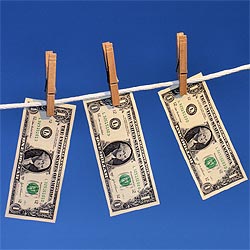Compliance
European Banks' AML Failings Revealed In New Data

European banks have a major money laundering problem, with the overwhelming majority of lenders in the region falling foul of the law.
The overwhelming majority of Europe’s largest banks – 90 per cent
– have been punished in some way for money laundering offences,
with at least 18 out of Europe’s top 20 banks fined in the last
10 years, according to a data firm. The figures come out at a
time when Europe’s financial sector has been rocked by scandals
in Estonia, Malta, Latvia and Denmark, among others.
UK-based Fortytwo
Data, which specialises in big data, anti-money laundering
and sanction-screening technology, said that all 10 of the
biggest banks in Europe have fallen foul of the AML authorities -
HSBC, Barclays and Lloyds from the UK, the French quartet BNP
Paribas, Crédit Agricole Group, Société Générale and Groupe BPCE,
Germany’s Deutsche Bank, Spain's Santander, and the Dutch bank
ING.
Recent weeks have seen banks such as Copenhagen-based Danske Bank, put under
the spotlight, leading to the resignation of its CEO and the
launch of a criminal
probe by the US Department of Justice. That saga – linked to
claims of money laundering via Estonia – has helped fuel calls
for the European Union to take a tougher, more co-ordinated
line on dirty money.
Other banks to have been fined in recent years are the British
banks RBS and Standard Chartered, Italy’s Intesa Sanpaolo SpA,
UBS and Credit Suisse, Spain’s Banco Bilbao, the Dutch
institution Rabobank, and Nordea Bank. All five major UK banks -
HSBC, Barclays, Lloyds, RBS and Standard Chartered - have been
fined for money laundering offences. Earlier this year, Donald
Toon, director of prosperity at the National Crime
Agency, admitted in a Treasury Meeting that money laundering
in the UK is “a very big problem” and estimated that the amount
of money laundered here each year has now risen to £150 billion
($195.6 billion).
“Money should not be laundered on their watch. However, standards
must be maintained. The fact that almost all of Europe’s 20
biggest banks are known to have failed to comply with AML
regulations is a troubling finding,” Julian Dixon, CEO of
Fortytwo Data, said.
A number of specialist firms such as smartKYC, AxiomSL and others
have developed systems to help bankers keep on top of
know-your-client and money laundering threats.
In 2014, BNP Paribas was fined $8.9 billion by the US for
sanctions breaches and failings, a record sum that prompted anger
from Paris about how the US was throwing its extra-territorial
weight around. The situation caused complaints that US banks have
been given a relatively easy international ride.
In Singapore, in May 2016, the local regulator kicked out BSI and
Falcon Private Bank, for example, for failings connected to money
linked to the state-run 1MDB fund of Malaysia. It also
fined Coutts and Standard Chartered.
(Editor's note: The evidence is damning but, as ever, the question to ask is what can be done about it? Fines are clearly a deterrent if they are large enough, but there remain a number of challenges. To begin with, there is a strong sense that different rules seem to apply to US-based banks than for the rest of the world. However, unfair a perception that may be, the US authorities' aggressive use of extra-territorial power to chase crooks when dollars are used is not often matched on the European side. Technology can play a big role in screening for dubious funds and enforcing rules, but it is not always sufficient, or a substitute in some cases for judgement. Some of the issues come from how money from the former Soviet Union and the Middle East finds a natural first home in Europe, so this is a region more likely than some others to feel the heat. It is not always clear whether the European Union has the means or the will to act sufficiently yet, although countries acting alone can achieve only limited progress. Sadly, when the stakes are high enough, dirty money will find a way of getting through. But clearly, this industry needs to raise its game.)